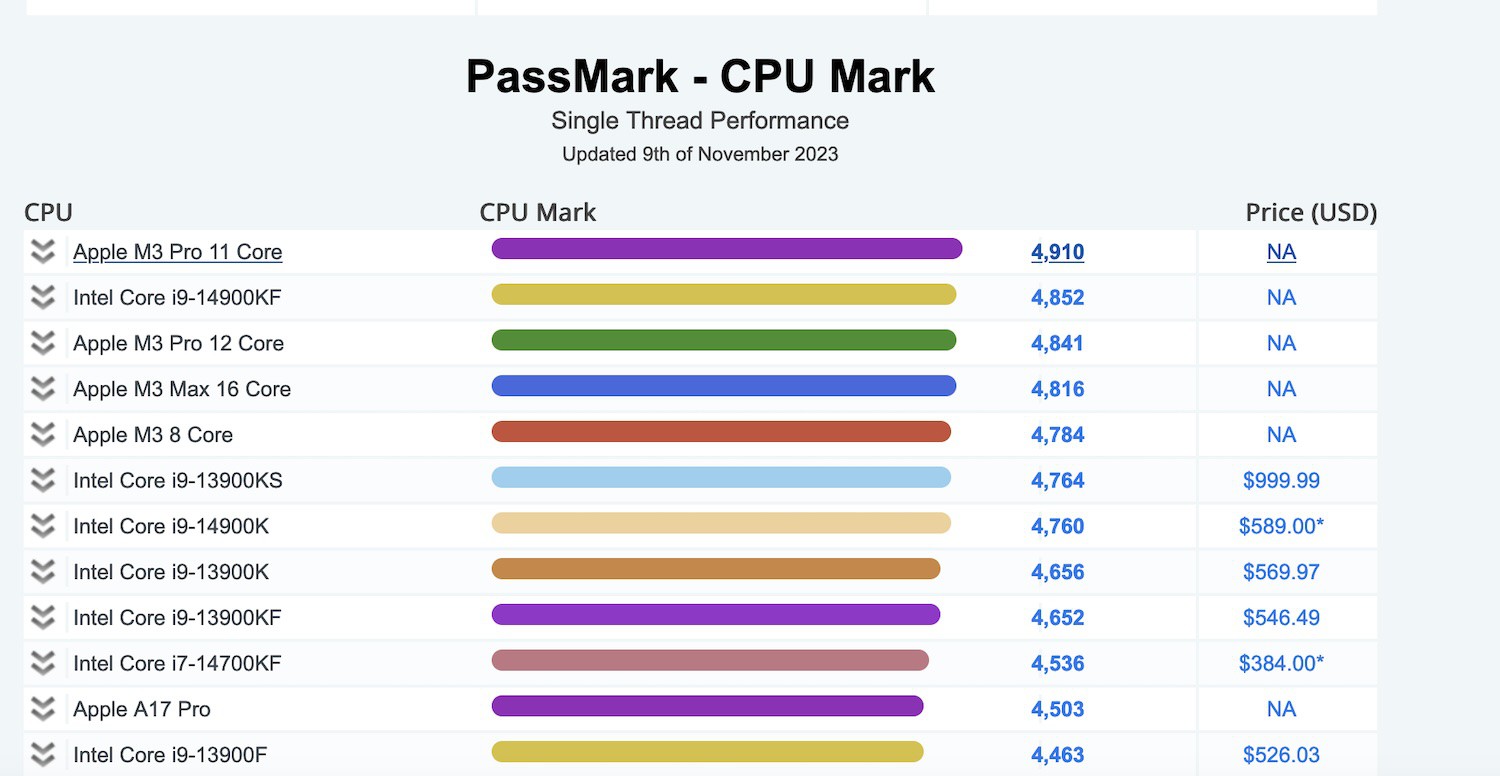On November 10, 2023, Single Thread Performance of a CPU measures its ability to process tasks using a single thread of data. This is particularly crucial for applications and tasks that only utilize a single thread, unable to share or leverage multiple threads simultaneously.
Single Thread Performance is essential in tasks such as office applications, web browsers, some games, and other single-threaded applications. A high Single Thread Performance score often signifies that the computer runs smoothly and quickly in these tasks.
Testing organizations and ranking tables use metrics such as PassMark, Geekbench, or Cinebench to assess the Single Thread Performance of CPUs.
According to an announcement from cpubenchmark.net, the latest performance test results of Apple's M3 processor line based on the PassMark standard have been revealed. Among them, the 11-core version of M3 Pro demonstrates superior performance compared to the i9-14900KF, securing the first position in the single-threaded performance ranking.

Meanwhile, the 12-core version of M3 Pro holds the third position, with Intel's i9-14900KF securing the second position. This indicates that the single-thread performance of the M3 Pro processor and i9-14900KF is nearly equivalent.
In terms of single-thread performance testing for the M3 processor lineup, the 11-core version of M3 Pro scores 4910 points, followed by the 12-core version of M3 Pro with 4841 points.
In the third position is the M3 Max processor with 16 cores, achieving a single-thread performance score of 4816 points. Lastly, in the fourth position is the 8-core version of M3, with a single-thread performance score of 4784 points.
However, in terms of multi-threaded performance, Intel's i9-14900KF processor significantly outperforms the M3 processor lineup. The multi-threaded performance of i9-14900KF is 34% higher than M3 Max with 16 cores and 56% higher than M3 Pro with 12 cores.
It's worth noting that the manufacturing process of Intel's i9-14900KF processor is 10nm, with a maximum power consumption of 253W, while Apple's M3 processor uses 3nm manufacturing technology, with a full load power consumption of less than 50W.
Single Thread Performance is essential in tasks such as office applications, web browsers, some games, and other single-threaded applications. A high Single Thread Performance score often signifies that the computer runs smoothly and quickly in these tasks.
Testing organizations and ranking tables use metrics such as PassMark, Geekbench, or Cinebench to assess the Single Thread Performance of CPUs.
According to an announcement from cpubenchmark.net, the latest performance test results of Apple's M3 processor line based on the PassMark standard have been revealed. Among them, the 11-core version of M3 Pro demonstrates superior performance compared to the i9-14900KF, securing the first position in the single-threaded performance ranking.

In terms of single-thread performance testing for the M3 processor lineup, the 11-core version of M3 Pro scores 4910 points, followed by the 12-core version of M3 Pro with 4841 points.
In the third position is the M3 Max processor with 16 cores, achieving a single-thread performance score of 4816 points. Lastly, in the fourth position is the 8-core version of M3, with a single-thread performance score of 4784 points.
However, in terms of multi-threaded performance, Intel's i9-14900KF processor significantly outperforms the M3 processor lineup. The multi-threaded performance of i9-14900KF is 34% higher than M3 Max with 16 cores and 56% higher than M3 Pro with 12 cores.
It's worth noting that the manufacturing process of Intel's i9-14900KF processor is 10nm, with a maximum power consumption of 253W, while Apple's M3 processor uses 3nm manufacturing technology, with a full load power consumption of less than 50W.
